Flashback 2017: The Year of Trumpery
By Ali Bhutto | Cover Story | Published 6 years ago
Eve of Terror
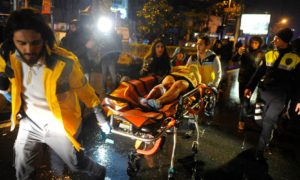 As a forewarning of events to come, 2017 was ushered in on a note of terror. Only an hour-and-a half into the new year, a gun-toting Santa opened fire in Istanbul’s Reina nightclub, killing 39 people and injuring 70 others. The perpetrator, Abdulkadir Masharipov, an Uzbek national who claimed allegiance to the Islamic State, was tracked down and captured in Istanbul on January 17. Masharipov, an educated, multilingual, financially comfortable man who supported a family, had been trained in Afghanistan before moving to Turkey in January 2016.
As a forewarning of events to come, 2017 was ushered in on a note of terror. Only an hour-and-a half into the new year, a gun-toting Santa opened fire in Istanbul’s Reina nightclub, killing 39 people and injuring 70 others. The perpetrator, Abdulkadir Masharipov, an Uzbek national who claimed allegiance to the Islamic State, was tracked down and captured in Istanbul on January 17. Masharipov, an educated, multilingual, financially comfortable man who supported a family, had been trained in Afghanistan before moving to Turkey in January 2016.
The Trump Card
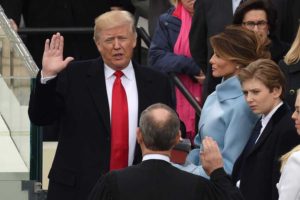 The start of 2017 marked the beginning of the age of Donald Trump, the 45th president of the United States. At his oathtaking ceremony on January 20, Trump’s speech — made to a crowd reportedly smaller than that of previous inaugurations — aimed at rousing populistic fervour. The new president promised to transfer power back into the hands of the American people and emphasised his isolationist mantra, ‘America first’ — a phrase previously known to have been used by a committee formed in 1940, to oppose America’s entry into the Second World War. In addition to announcing widescale infrastructure development programmes across the nation, Trump specified that policy on immigrants, foreign affairs, trade and taxes would be formulated keeping in mind the best interests of US citizens.
The start of 2017 marked the beginning of the age of Donald Trump, the 45th president of the United States. At his oathtaking ceremony on January 20, Trump’s speech — made to a crowd reportedly smaller than that of previous inaugurations — aimed at rousing populistic fervour. The new president promised to transfer power back into the hands of the American people and emphasised his isolationist mantra, ‘America first’ — a phrase previously known to have been used by a committee formed in 1940, to oppose America’s entry into the Second World War. In addition to announcing widescale infrastructure development programmes across the nation, Trump specified that policy on immigrants, foreign affairs, trade and taxes would be formulated keeping in mind the best interests of US citizens.
Spy vs Spy
 Against the backdrop of alleged Russian meddling in the 2016 presidential campaign, a US intelligence report surfaced on March 2, indicating that Russia had hacked into the accounts of members of the US Department of Defence.
Against the backdrop of alleged Russian meddling in the 2016 presidential campaign, a US intelligence report surfaced on March 2, indicating that Russia had hacked into the accounts of members of the US Department of Defence.
Brexit Begins

Brexit series for FT.
On March 29, British Prime Minister, Theresa May, formally notified the European Council of the UK’s decision to withdraw from the European Union (EU), in accordance with Article 50(2) of the Treaty of Lisbon. Through the letter, which was addressed to the council’s President, Donald Tusk, May activated the Brexit process nine months after the milestone referendum, in which British citizens voted to leave the EU.
The Beginning of the End?
Islamic State (IS) was weakened significantly as a force in 2017. Airwars, a non-profit, transparency project that archives the global war against the IS, counted 28,522 civilian casualties as of December 2017, from airstrikes by the American-led coalition in Iraq, Syria and Libya.
 On February 14, Iraqi Prime Minister Haider al-Abadi announced the start of a campaign to
On February 14, Iraqi Prime Minister Haider al-Abadi announced the start of a campaign to  liberate the west bank of Mosul from IS militants, after securing the east bank of the city in January. By March 7, Iraqi forces had made significant gains in western Mosul, recapturing the Mosul museum and the Central Bank, and in July, the Iraqi army claimed that there were approximately 300 IS fighters remaining in the city, compared to the 6,000 strong force that had occupied it at the start of the offensive in October, 2016. At the same time, 800,000 civilians had fled, according to the figures of the International Organisation for Migration. Victory was declared by the Iraqi government — first in Mosul, in July, and then in the remaining one-third of the country under IS occupation, in December.
liberate the west bank of Mosul from IS militants, after securing the east bank of the city in January. By March 7, Iraqi forces had made significant gains in western Mosul, recapturing the Mosul museum and the Central Bank, and in July, the Iraqi army claimed that there were approximately 300 IS fighters remaining in the city, compared to the 6,000 strong force that had occupied it at the start of the offensive in October, 2016. At the same time, 800,000 civilians had fled, according to the figures of the International Organisation for Migration. Victory was declared by the Iraqi government — first in Mosul, in July, and then in the remaining one-third of the country under IS occupation, in December.
By June 2017, operations carried out by the US-led coalition, as well as Russian air strikes in Syria, had recovered 60,000 square kilometres of territory in Iraq and Syria, liberating over four million people. On October 17, the coalition announced that Syrian Democratic Forces had regained control over 90 per cent of Raqqa, the Syrian city that IS claimed as the capital of its caliphate.
Vive le Macron
 Relative newcomer and independent candidate, Emmanuel Macron, pulled off a surprise victory in the French presidential race on May 8 by obtaining almost two-thirds of the vote, and defeating Marine Le Pen, leader of the Front National. Thirty-nine-year-old Macron, who had never before been elected to a government post, is reportedly the country’s youngest head of state since Napoleon Bonaparte.
Relative newcomer and independent candidate, Emmanuel Macron, pulled off a surprise victory in the French presidential race on May 8 by obtaining almost two-thirds of the vote, and defeating Marine Le Pen, leader of the Front National. Thirty-nine-year-old Macron, who had never before been elected to a government post, is reportedly the country’s youngest head of state since Napoleon Bonaparte.
Prez vs Spy
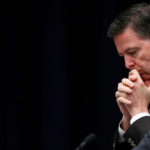 On May 10, US President Donald Trump fired the man heading a criminal investigation into the former’s links to Russian meddling in the 2016 presidential election campaign. Citing reasons for dismissing FBI director James Comey, Trump said that he was not satisfied with the manner in which Comey had conducted the investigation into Hillary Clinton’s use of a private email server, revealing her emails 11 days before the election. The decision raised questions over the FBI’s ability to function independently and was decried by Democrats, who in the Senate labelled the move as being “Nixonian.”
On May 10, US President Donald Trump fired the man heading a criminal investigation into the former’s links to Russian meddling in the 2016 presidential election campaign. Citing reasons for dismissing FBI director James Comey, Trump said that he was not satisfied with the manner in which Comey had conducted the investigation into Hillary Clinton’s use of a private email server, revealing her emails 11 days before the election. The decision raised questions over the FBI’s ability to function independently and was decried by Democrats, who in the Senate labelled the move as being “Nixonian.”
Back to the Future
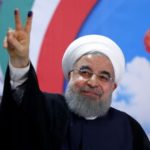 On May 20, Hassan Rouhani defeated his rival Ebrahim Raisi, to be re-elected President of the Islamic Republic of Iran, with 57 per cent of the vote. The election saw a massive turnout, which resulted in the polling time being being extended by several hours to accommodate all the voters. Rouhani returned as president on the back of promises of global integration and strengthening Iran’s economy.
On May 20, Hassan Rouhani defeated his rival Ebrahim Raisi, to be re-elected President of the Islamic Republic of Iran, with 57 per cent of the vote. The election saw a massive turnout, which resulted in the polling time being being extended by several hours to accommodate all the voters. Rouhani returned as president on the back of promises of global integration and strengthening Iran’s economy.
Choking the Climate
American President Donald Trump confirmed on June 1, his intention of pulling out of the Paris climate deal, despite the US being the world’s second-largest emitter of greenhouse gases. Claiming that the Paris agreement handicapped the US and kept it “bound down,” Trump told a press conference that he would only support a deal that he perceived as “fair” to his country. The US kickstarted the three-year process by submitting its official notice of withdrawal to the United Nations in August, but with a proviso that it would remain open to renegotiation in the future, if it saw an improvement in the terms of the agreement.
Conservative Slip
The UK’s snap election of June 8, called by Theresa May in the hope of achieving the strong mandate needed to effectively push forward with Brexit, resulted in the Conservatives losing their majority in parliament. With the Tories winning 312 seats and Labour securing 262, May pledged to form a minority government.
Summits of Discontent
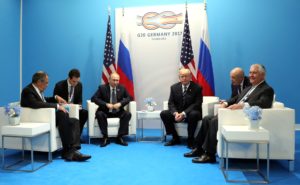 At the G20 Summit held in Hamburg on July 7-8, leaders such as Theresa May and Emmanuel Macron tried to persuade Donald Trump to change his stance on the Paris climate deal, with little success. In the communique of the summit, held on the final day, all participants agreed on the points put forward, except for the US, which had withdrawn from the climate deal.
At the G20 Summit held in Hamburg on July 7-8, leaders such as Theresa May and Emmanuel Macron tried to persuade Donald Trump to change his stance on the Paris climate deal, with little success. In the communique of the summit, held on the final day, all participants agreed on the points put forward, except for the US, which had withdrawn from the climate deal.
On the sidelines of the summit, Russian meddling in the 2016 election campaign came under discussion in a meeting between Vladimir Putin and Trump that lasted over two hours and in which, according to Putin, Trump accepted that Russia did not interfere in the presidential campaign.
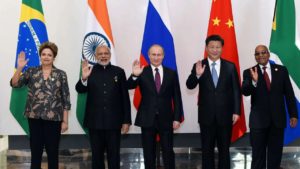 The BRICS Summit, held in Xiamen, China, from September 3-5, was attended by the heads of state of Russia, China, India, Brazil and South Africa. The summit witnessed a strengthening of ties between China and India, who only days earlier had been embroiled in a deadlock along the border between the two countries in the Doklam area.
The BRICS Summit, held in Xiamen, China, from September 3-5, was attended by the heads of state of Russia, China, India, Brazil and South Africa. The summit witnessed a strengthening of ties between China and India, who only days earlier had been embroiled in a deadlock along the border between the two countries in the Doklam area.
The North Korean nuclear threat and the Iran nuclear deal loomed large over the 72nd session of the UN General Assembly, held on September 12-25, in New York, NY. Trump’s intention of withdrawing from the nuclear deal with Iran widened the rift between his administration and Europe, and sealed the UN’s status as an outdated and toothless descendant of the League of Nations.
‘Testing’ Waters
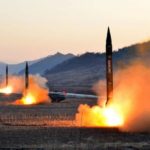 North Korea conducted 16 nuclear missile tests in 2017, in which it fired 23 missiles. Kim Jong-un, who is always shown to be having a good laugh with his top generals in photographs published in international media reports, test fired an intercontinental ballistic missile on July 4, terming it a “gift” to Americans on their nation’s day of independence. Another missile, fired on November 29, landed in Japan’s exclusive economic zone.
North Korea conducted 16 nuclear missile tests in 2017, in which it fired 23 missiles. Kim Jong-un, who is always shown to be having a good laugh with his top generals in photographs published in international media reports, test fired an intercontinental ballistic missile on July 4, terming it a “gift” to Americans on their nation’s day of independence. Another missile, fired on November 29, landed in Japan’s exclusive economic zone.
Rise of the Right
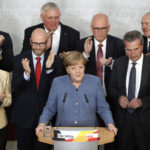 The 19th Bundestag was elected on September 24, with Angela Merkel winning a fourth term. The election marked the historic rise of the nationalist, anti-immigrant and anti-Islamic Alternative for Germany (AFD) party, which came out as the third largest party in the German parliament.
The 19th Bundestag was elected on September 24, with Angela Merkel winning a fourth term. The election marked the historic rise of the nationalist, anti-immigrant and anti-Islamic Alternative for Germany (AFD) party, which came out as the third largest party in the German parliament.
Mowing Down a Minority
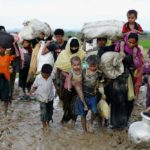 Myanmar’s military initiated a crackdown on Rohingya Muslims in the country’s northern Rakhine state, in response to an attack on police posts and an army base by Rohingya insurgents on August 25. According to Medicins Sans Frontieres (Doctors Without Borders), 6,700 Rohingyas, of which at least 730 were children under the age of five, were killed in the first month of the crackdown. The violence resulted in a mass exodus, with Rohingyas fleeing across the border, into Bangladesh. Over 640,000 members of the Rohingya community have fled Rakhine state since August. In November, Myanmar and Bangladesh signed a deal for the return of Rohingya refugees to Rakhine, yet no details were provided on how the victimised community would be repatriated, or how their safety would be guaranteed upon their return.
Myanmar’s military initiated a crackdown on Rohingya Muslims in the country’s northern Rakhine state, in response to an attack on police posts and an army base by Rohingya insurgents on August 25. According to Medicins Sans Frontieres (Doctors Without Borders), 6,700 Rohingyas, of which at least 730 were children under the age of five, were killed in the first month of the crackdown. The violence resulted in a mass exodus, with Rohingyas fleeing across the border, into Bangladesh. Over 640,000 members of the Rohingya community have fled Rakhine state since August. In November, Myanmar and Bangladesh signed a deal for the return of Rohingya refugees to Rakhine, yet no details were provided on how the victimised community would be repatriated, or how their safety would be guaranteed upon their return.
Angry Waters
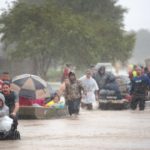 According to a new study conducted by the scientific journal Environmental Research Letters, Hurricane Harvey’s intensity was driven by climate change. Harvey, which made landfall as a category 4 hurricane on the Texas coastline on August 25, wreaked havoc over southeast Texas and southwest Lousiana, killing a total of 82 people and causing $180 billion worth of damages in its wake. Meanwhile Hurricane Irma, also a category 4 hurricane, which lasted from August 31 to September 11, was the strongest hurricane ever recorded in the Atlantic (outside the Caribbean Sea and the Gulf of Mexico). It left a trail of mass destruction in southwest Florida, resulting in a death toll of approximately 61 people, and caused damages worth up to $200 billion.
According to a new study conducted by the scientific journal Environmental Research Letters, Hurricane Harvey’s intensity was driven by climate change. Harvey, which made landfall as a category 4 hurricane on the Texas coastline on August 25, wreaked havoc over southeast Texas and southwest Lousiana, killing a total of 82 people and causing $180 billion worth of damages in its wake. Meanwhile Hurricane Irma, also a category 4 hurricane, which lasted from August 31 to September 11, was the strongest hurricane ever recorded in the Atlantic (outside the Caribbean Sea and the Gulf of Mexico). It left a trail of mass destruction in southwest Florida, resulting in a death toll of approximately 61 people, and caused damages worth up to $200 billion.
This was not the end of the apocalyptic scenario and within days, another category 4 hurricane, named Maria, struck Puerto Rico and the Virgin Islands. While the casualty count of Maria has been disputed, the official death toll stands at 55, with damages up to $95 billion.
Short-lived Secession
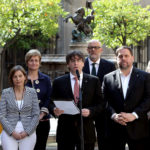 In an independence referendum held in Catalonia, on October 1, with a 42 per cent turnout, 90 per cent voted in favour of secession from Spain. Despite the referendum being declared unconstitutional by a Spanish court, the Catalonian parliament declared independence in a secret vote on October 24. Madrid responded with a crackdown, as under the Spanish constitution, the country could not be divided. Catalonia’s secessionist leaders either went into exile, or were imprisoned. Catalonia’s president, Carles Puigdemont, was ousted and fled to Belgium to avoid arrest, and there he began campaigning to be re-elected as president in the December 21 election in the region.
In an independence referendum held in Catalonia, on October 1, with a 42 per cent turnout, 90 per cent voted in favour of secession from Spain. Despite the referendum being declared unconstitutional by a Spanish court, the Catalonian parliament declared independence in a secret vote on October 24. Madrid responded with a crackdown, as under the Spanish constitution, the country could not be divided. Catalonia’s secessionist leaders either went into exile, or were imprisoned. Catalonia’s president, Carles Puigdemont, was ousted and fled to Belgium to avoid arrest, and there he began campaigning to be re-elected as president in the December 21 election in the region.
Capital Evil
 On December 6, 2017, to the delight of the Israeli rabid right and the mortification of the Palestinians, American President Donald Trump announced that the US formally recognised Jerusalem as the capital of Israel. The proclamation resulted in a wave of protests across the globe in the days that followed. Demonstrations and solidarity rallies were organised in Jerusalem, Gaza, the West Bank, Beirut, Rabat, Amman, Tokyo, Jakarta, Karachi, Istanbul and Chicago. Stone throwing protestors in Gaza and elsewhere met with the standard Israeli response: brutal reprisals. Additionally, Israel launched air raids on Palestinian targets, which resulted in at least two casualties.
On December 6, 2017, to the delight of the Israeli rabid right and the mortification of the Palestinians, American President Donald Trump announced that the US formally recognised Jerusalem as the capital of Israel. The proclamation resulted in a wave of protests across the globe in the days that followed. Demonstrations and solidarity rallies were organised in Jerusalem, Gaza, the West Bank, Beirut, Rabat, Amman, Tokyo, Jakarta, Karachi, Istanbul and Chicago. Stone throwing protestors in Gaza and elsewhere met with the standard Israeli response: brutal reprisals. Additionally, Israel launched air raids on Palestinian targets, which resulted in at least two casualties.
Paradise Gained
 The German newspaper, Süddeutsche Zeitung, obtained leaked financial documents termed ‘The Paradise Papers,’ that shed light on the offshore financial affairs of numerous politicians, famous personalities and multinationals from across the globe. The German paper asked the International Consortium of Investigative Journalists (ICIJ) to oversee the investigation into the leaks being carried out by newspapers worldwide, which exposed Prince Charles’, Apple’s, Formula 1 driver Lewis Hamilton’s, and many others’ hidden stashes. The documents were made public on November 5.
The German newspaper, Süddeutsche Zeitung, obtained leaked financial documents termed ‘The Paradise Papers,’ that shed light on the offshore financial affairs of numerous politicians, famous personalities and multinationals from across the globe. The German paper asked the International Consortium of Investigative Journalists (ICIJ) to oversee the investigation into the leaks being carried out by newspapers worldwide, which exposed Prince Charles’, Apple’s, Formula 1 driver Lewis Hamilton’s, and many others’ hidden stashes. The documents were made public on November 5.
The writer is a staffer at Newsline Magazine. His website is at: www.alibhutto.com
No more posts to load


